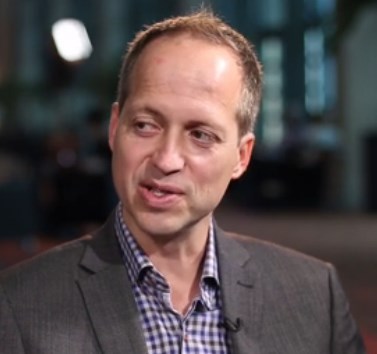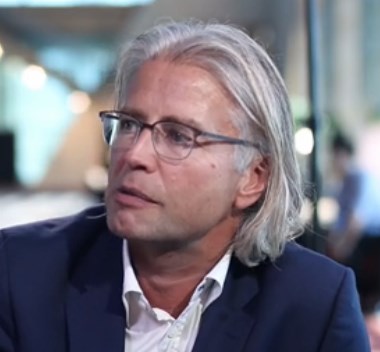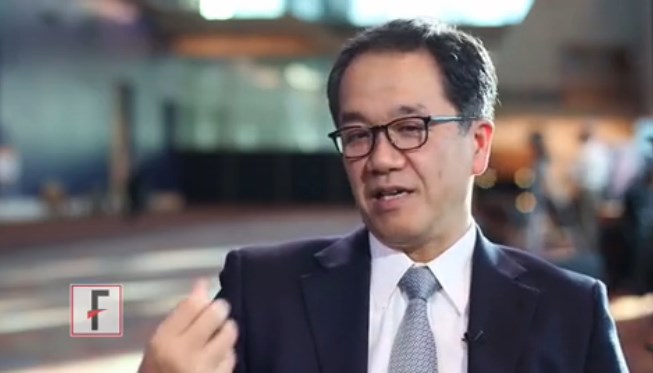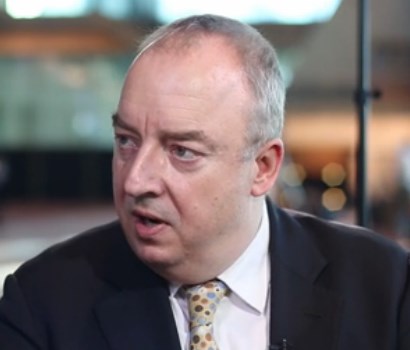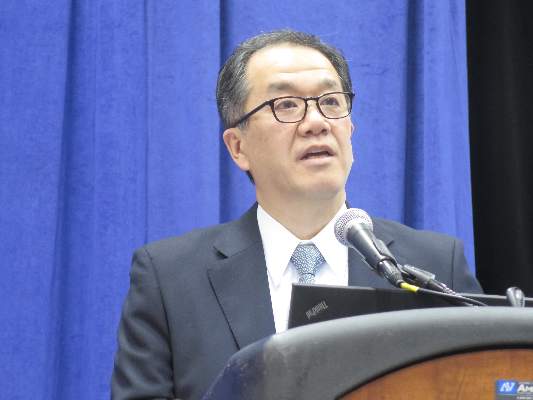User login
Cancer Therapy & Research Center (CTRC)/ American Association for Cancer Research (AACR): San Antonio Breast Cancer Symposium (SABCS)
VIDEO: APOBEC3B enzyme may limit tamoxifen efficacy
SAN ANTONIO – Patients with estrogen receptor–positive breast cancers who had up-regulation of the APOBEC3B enzyme – a DNA-mutating enzyme – had a shorter time to progression on tamoxifen. In addition, suppressing levels of the enzyme in a preclinical model reduced tamoxifen resistance. In an interview, Reuben Harris, Ph.D., professor in the department of biochemistry, molecular biology, and biophysics at the University of Minnesota, Minneapolis, discussed the study’s findings and what they mean for the conduct of clinical trials and for future research.
The video associated with this article is no longer available on this site. Please view all of our videos on the MDedge YouTube channel
SAN ANTONIO – Patients with estrogen receptor–positive breast cancers who had up-regulation of the APOBEC3B enzyme – a DNA-mutating enzyme – had a shorter time to progression on tamoxifen. In addition, suppressing levels of the enzyme in a preclinical model reduced tamoxifen resistance. In an interview, Reuben Harris, Ph.D., professor in the department of biochemistry, molecular biology, and biophysics at the University of Minnesota, Minneapolis, discussed the study’s findings and what they mean for the conduct of clinical trials and for future research.
The video associated with this article is no longer available on this site. Please view all of our videos on the MDedge YouTube channel
SAN ANTONIO – Patients with estrogen receptor–positive breast cancers who had up-regulation of the APOBEC3B enzyme – a DNA-mutating enzyme – had a shorter time to progression on tamoxifen. In addition, suppressing levels of the enzyme in a preclinical model reduced tamoxifen resistance. In an interview, Reuben Harris, Ph.D., professor in the department of biochemistry, molecular biology, and biophysics at the University of Minnesota, Minneapolis, discussed the study’s findings and what they mean for the conduct of clinical trials and for future research.
The video associated with this article is no longer available on this site. Please view all of our videos on the MDedge YouTube channel
AT SABCS 2015
VIDEO: Mastectomy plus reconstruction has highest complication rates of all early BC treatment options
SAN ANTONIO – Mastectomy with reconstruction is the outlier in terms of complication rates and cost among options for local therapy for early breast cancer, according to a large observational study presented at the San Antonio Breast Cancer Symposium.
Complication rates during the first 2 years after diagnosis were roughly twice as high for mastectomy plus reconstruction, compared with lumpectomy with whole breast irradiation. Moreover, average total procedural and complication costs were $23,000 greater for women aged 65 years or younger who opted for mastectomy plus reconstruction than for those who chose lumpectomy plus whole breast irradiation. These fresh insights into the trade-offs involved in local treatment options should prove useful in oncologists’ discussions with newly diagnosed patients, as well as for payers, as Dr. Benjamin D. Smith of University of Texas M.D. Anderson Cancer Center, Houston, explains in an interview.
The video associated with this article is no longer available on this site. Please view all of our videos on the MDedge YouTube channel
SAN ANTONIO – Mastectomy with reconstruction is the outlier in terms of complication rates and cost among options for local therapy for early breast cancer, according to a large observational study presented at the San Antonio Breast Cancer Symposium.
Complication rates during the first 2 years after diagnosis were roughly twice as high for mastectomy plus reconstruction, compared with lumpectomy with whole breast irradiation. Moreover, average total procedural and complication costs were $23,000 greater for women aged 65 years or younger who opted for mastectomy plus reconstruction than for those who chose lumpectomy plus whole breast irradiation. These fresh insights into the trade-offs involved in local treatment options should prove useful in oncologists’ discussions with newly diagnosed patients, as well as for payers, as Dr. Benjamin D. Smith of University of Texas M.D. Anderson Cancer Center, Houston, explains in an interview.
The video associated with this article is no longer available on this site. Please view all of our videos on the MDedge YouTube channel
SAN ANTONIO – Mastectomy with reconstruction is the outlier in terms of complication rates and cost among options for local therapy for early breast cancer, according to a large observational study presented at the San Antonio Breast Cancer Symposium.
Complication rates during the first 2 years after diagnosis were roughly twice as high for mastectomy plus reconstruction, compared with lumpectomy with whole breast irradiation. Moreover, average total procedural and complication costs were $23,000 greater for women aged 65 years or younger who opted for mastectomy plus reconstruction than for those who chose lumpectomy plus whole breast irradiation. These fresh insights into the trade-offs involved in local treatment options should prove useful in oncologists’ discussions with newly diagnosed patients, as well as for payers, as Dr. Benjamin D. Smith of University of Texas M.D. Anderson Cancer Center, Houston, explains in an interview.
The video associated with this article is no longer available on this site. Please view all of our videos on the MDedge YouTube channel
AT SABCS 2015
VIDEO: Triple-negative breast cancer outcomes boosted by adding carboplatin to neoadjuvant chemo
SAN ANTONIO – Adding weekly carboplatin to 18 weeks of anthracycline/taxane-based neoadjuvant chemotherapy markedly improved disease-free survival in patients with triple-negative breast cancer, according to updated results from the GeparSixto trial presented at the San Antonio Breast Cancer Symposium.
Dr. Gunter von Minckwitz, president of the German Breast Group, explains in an interview that the nearly 50% reduction in the risk of disease relapse at 3 years seen in the phase II trial has converted him and his coinvestigators to routine use of add-on carboplatin in triple-negative breast cancer patients on neoadjuvant chemotherapy.
The video associated with this article is no longer available on this site. Please view all of our videos on the MDedge YouTube channel
SAN ANTONIO – Adding weekly carboplatin to 18 weeks of anthracycline/taxane-based neoadjuvant chemotherapy markedly improved disease-free survival in patients with triple-negative breast cancer, according to updated results from the GeparSixto trial presented at the San Antonio Breast Cancer Symposium.
Dr. Gunter von Minckwitz, president of the German Breast Group, explains in an interview that the nearly 50% reduction in the risk of disease relapse at 3 years seen in the phase II trial has converted him and his coinvestigators to routine use of add-on carboplatin in triple-negative breast cancer patients on neoadjuvant chemotherapy.
The video associated with this article is no longer available on this site. Please view all of our videos on the MDedge YouTube channel
SAN ANTONIO – Adding weekly carboplatin to 18 weeks of anthracycline/taxane-based neoadjuvant chemotherapy markedly improved disease-free survival in patients with triple-negative breast cancer, according to updated results from the GeparSixto trial presented at the San Antonio Breast Cancer Symposium.
Dr. Gunter von Minckwitz, president of the German Breast Group, explains in an interview that the nearly 50% reduction in the risk of disease relapse at 3 years seen in the phase II trial has converted him and his coinvestigators to routine use of add-on carboplatin in triple-negative breast cancer patients on neoadjuvant chemotherapy.
The video associated with this article is no longer available on this site. Please view all of our videos on the MDedge YouTube channel
AT SABCS 2015
VIDEO: Adjuvant capecitabine has role for residual disease after neoadjuvant therapy
SAN ANTONIO – Adjuvant capecitabine improved both disease-free and overall survival in women with HER2-negative breast cancer who had residual disease after neoadjuvant chemotherapy. In an interview, Dr. Masakazu Toi, a professor at Kyoto University Hospital, and founder and senior director of the Japan Breast Cancer Research Group, discusses the phase III CREATE-X trial and its implications for clinical care.
The video associated with this article is no longer available on this site. Please view all of our videos on the MDedge YouTube channel
SAN ANTONIO – Adjuvant capecitabine improved both disease-free and overall survival in women with HER2-negative breast cancer who had residual disease after neoadjuvant chemotherapy. In an interview, Dr. Masakazu Toi, a professor at Kyoto University Hospital, and founder and senior director of the Japan Breast Cancer Research Group, discusses the phase III CREATE-X trial and its implications for clinical care.
The video associated with this article is no longer available on this site. Please view all of our videos on the MDedge YouTube channel
SAN ANTONIO – Adjuvant capecitabine improved both disease-free and overall survival in women with HER2-negative breast cancer who had residual disease after neoadjuvant chemotherapy. In an interview, Dr. Masakazu Toi, a professor at Kyoto University Hospital, and founder and senior director of the Japan Breast Cancer Research Group, discusses the phase III CREATE-X trial and its implications for clinical care.
The video associated with this article is no longer available on this site. Please view all of our videos on the MDedge YouTube channel
AT SABCS 2015
VIDEO: Win-win with denosumab as adjuvant therapy for post-menopausal breast cancer
SAN ANTONIO – Adding denosumab to adjuvant aromatase inhibitor therapy, not only reduced risk of fracture, but also improved disease-free survival for postmenopausal patients with early-stage, hormone receptor–positive breast cancer, according to results presented at the San Antonio Breast Cancer Symposium.
In an interview, Dr. Michael Gnant, professor of surgery at the Medical University of Vienna, discusses the phase III ABCSG-18 clinical trial, and why he will now be prescribing denosumab to HR-positive breast cancer patients who are receiving adjuvant aromatase inhibitor therapy, regardless of their bone health status.
The video associated with this article is no longer available on this site. Please view all of our videos on the MDedge YouTube channel
SAN ANTONIO – Adding denosumab to adjuvant aromatase inhibitor therapy, not only reduced risk of fracture, but also improved disease-free survival for postmenopausal patients with early-stage, hormone receptor–positive breast cancer, according to results presented at the San Antonio Breast Cancer Symposium.
In an interview, Dr. Michael Gnant, professor of surgery at the Medical University of Vienna, discusses the phase III ABCSG-18 clinical trial, and why he will now be prescribing denosumab to HR-positive breast cancer patients who are receiving adjuvant aromatase inhibitor therapy, regardless of their bone health status.
The video associated with this article is no longer available on this site. Please view all of our videos on the MDedge YouTube channel
SAN ANTONIO – Adding denosumab to adjuvant aromatase inhibitor therapy, not only reduced risk of fracture, but also improved disease-free survival for postmenopausal patients with early-stage, hormone receptor–positive breast cancer, according to results presented at the San Antonio Breast Cancer Symposium.
In an interview, Dr. Michael Gnant, professor of surgery at the Medical University of Vienna, discusses the phase III ABCSG-18 clinical trial, and why he will now be prescribing denosumab to HR-positive breast cancer patients who are receiving adjuvant aromatase inhibitor therapy, regardless of their bone health status.
The video associated with this article is no longer available on this site. Please view all of our videos on the MDedge YouTube channel
AT SABCS 2015
SABCS: CREATE-X – Capecitabine is efficacious against residual HER2-negative breast cancer
SAN ANTONIO – Adjuvant capecitabine improves outcomes in women with HER2-negative breast cancer who still have invasive disease after neoadjuvant chemotherapy, according to findings of the CREATE-X trial reported at the San Antonio Breast Cancer Symposium.
“Patients with pathologic residual invasive disease after neoadjuvant chemotherapy have a higher risk for relapse,” said presenting author Dr. Masakazu Toi, a professor at Kyoto University Hospital in Japan, and founder and senior director of the Japan Breast Cancer Research Group (JBCRG). But “it is unclear whether postoperative systemic chemotherapy following neoadjuvant chemotherapy is able to prolong survival.”
The phase III trial was conducted among 910 patients with early breast cancer in Japan and Korea who still had positive nodes or didn’t achieve a pathologic complete response after receipt of neoadjuvant chemotherapy that included an anthracycline, a taxane, or both. They were randomized to open-label adjuvant capecitabine (Xeloda) or no capecitabine, in addition to standard therapy.
Results of a preplanned 2-year interim analysis, reported in a session and related press briefing, showed that the risk of disease-free survival events was 30% lower and the risk of death was 40% lower among women given capecitabine than among counterparts not given the drug, prompting early stopping of the trial.
The disease-free survival results were similar in subgroup analyses. In particular, benefit was similar in patients with triple-negative disease, who historically haven’t fared well on this drug.
“The balance of benefit and toxicity would favor the use of capecitabine in [this] post–neoadjuvant chemotherapy situation, but prediction for therapeutic benefit needs to be investigated further,” Dr. Toi concluded. “The cost-effectiveness analysis will be carried out soon,” he added.
Press briefing moderator Dr. Virginia Kaklamani, codirector of the San Antonio Breast Cancer Symposium, as well as professor of medicine in the division of hematology/oncology at the University of Texas, San Antonio, and leader of the Breast Cancer Program, Cancer Therapy & Research Center there, wondered if the results are practice changing.
“On Monday morning, when I see a patient who has residual disease after neoadjuvant chemotherapy, what do I tell her?” she asked.
“I think we need to take care of the reimbursement issue,” Dr. Toi replied, referring to the current lack of U.S. Food and Drug Administration approval of capecitabine for this indication. “But personally, I would like to consider this treatment.”
In the session where the findings were presented, some attendees expressed skepticism about the observed benefit of capecitabine, given previous studies.
This benefit may have been due in part to the fact that in CREATE-X, capecitabine was given largely because it does not have cross-resistance with anthracyclines and taxanes, Dr. Toi speculated.
Attendee Dr. Steven Vogl, an oncologist at the Montefiore Medical Center in New York, proposed that the findings may have different implications for women with estrogen receptor–positive versus triple-negative disease, based on both their likelihood of pathologic complete response (pCR)and the prognostic impact of that response.
“I put it to you that really what this tells us is if we have a triple-negative patient who doesn’t achieve pCR after good neoadjuvant therapy, this [capecitabine] is probably a reasonable option, even though it’s quite toxic, and certainly should be explored further,” he said. “I’m not sure I would go home and treat my ER-positive patients who don’t get a pCR with capecitabine based on this study.”
In the trial, the 2-year disease-free survival rate – the trial’s primary endpoint – was 82.8% with capecitabine and 74.0% without it. The estimated 5-year rates were 74.1% and 67.7%, respectively (hazard ratio, 0.70; P = .005).
Furthermore, the 2-year overall survival rate was 94% with capecitabine and 89.2% without it. The estimated 5-year rates were 89.2% and 83.9%, respectively (HR, 0.60; P less than .01).
Patients in the capecitabine arm were more likely to experience grade 3 or worse neutropenia (7% vs. 2%) and diarrhea (3% vs. less than 1%). And 11% developed grade 3 hand-foot syndrome. However, these toxicities were manageable, according to the investigators.
Dr. Toi disclosed that he receives a research grant from Chugai Pharmaceutical Company. The trial was supported by a grant from Specified Nonprofit Corporation – Advanced Clinical Research Organization (ACRO) and other donations to the Japan Breast Cancer Research Group.
SAN ANTONIO – Adjuvant capecitabine improves outcomes in women with HER2-negative breast cancer who still have invasive disease after neoadjuvant chemotherapy, according to findings of the CREATE-X trial reported at the San Antonio Breast Cancer Symposium.
“Patients with pathologic residual invasive disease after neoadjuvant chemotherapy have a higher risk for relapse,” said presenting author Dr. Masakazu Toi, a professor at Kyoto University Hospital in Japan, and founder and senior director of the Japan Breast Cancer Research Group (JBCRG). But “it is unclear whether postoperative systemic chemotherapy following neoadjuvant chemotherapy is able to prolong survival.”
The phase III trial was conducted among 910 patients with early breast cancer in Japan and Korea who still had positive nodes or didn’t achieve a pathologic complete response after receipt of neoadjuvant chemotherapy that included an anthracycline, a taxane, or both. They were randomized to open-label adjuvant capecitabine (Xeloda) or no capecitabine, in addition to standard therapy.
Results of a preplanned 2-year interim analysis, reported in a session and related press briefing, showed that the risk of disease-free survival events was 30% lower and the risk of death was 40% lower among women given capecitabine than among counterparts not given the drug, prompting early stopping of the trial.
The disease-free survival results were similar in subgroup analyses. In particular, benefit was similar in patients with triple-negative disease, who historically haven’t fared well on this drug.
“The balance of benefit and toxicity would favor the use of capecitabine in [this] post–neoadjuvant chemotherapy situation, but prediction for therapeutic benefit needs to be investigated further,” Dr. Toi concluded. “The cost-effectiveness analysis will be carried out soon,” he added.
Press briefing moderator Dr. Virginia Kaklamani, codirector of the San Antonio Breast Cancer Symposium, as well as professor of medicine in the division of hematology/oncology at the University of Texas, San Antonio, and leader of the Breast Cancer Program, Cancer Therapy & Research Center there, wondered if the results are practice changing.
“On Monday morning, when I see a patient who has residual disease after neoadjuvant chemotherapy, what do I tell her?” she asked.
“I think we need to take care of the reimbursement issue,” Dr. Toi replied, referring to the current lack of U.S. Food and Drug Administration approval of capecitabine for this indication. “But personally, I would like to consider this treatment.”
In the session where the findings were presented, some attendees expressed skepticism about the observed benefit of capecitabine, given previous studies.
This benefit may have been due in part to the fact that in CREATE-X, capecitabine was given largely because it does not have cross-resistance with anthracyclines and taxanes, Dr. Toi speculated.
Attendee Dr. Steven Vogl, an oncologist at the Montefiore Medical Center in New York, proposed that the findings may have different implications for women with estrogen receptor–positive versus triple-negative disease, based on both their likelihood of pathologic complete response (pCR)and the prognostic impact of that response.
“I put it to you that really what this tells us is if we have a triple-negative patient who doesn’t achieve pCR after good neoadjuvant therapy, this [capecitabine] is probably a reasonable option, even though it’s quite toxic, and certainly should be explored further,” he said. “I’m not sure I would go home and treat my ER-positive patients who don’t get a pCR with capecitabine based on this study.”
In the trial, the 2-year disease-free survival rate – the trial’s primary endpoint – was 82.8% with capecitabine and 74.0% without it. The estimated 5-year rates were 74.1% and 67.7%, respectively (hazard ratio, 0.70; P = .005).
Furthermore, the 2-year overall survival rate was 94% with capecitabine and 89.2% without it. The estimated 5-year rates were 89.2% and 83.9%, respectively (HR, 0.60; P less than .01).
Patients in the capecitabine arm were more likely to experience grade 3 or worse neutropenia (7% vs. 2%) and diarrhea (3% vs. less than 1%). And 11% developed grade 3 hand-foot syndrome. However, these toxicities were manageable, according to the investigators.
Dr. Toi disclosed that he receives a research grant from Chugai Pharmaceutical Company. The trial was supported by a grant from Specified Nonprofit Corporation – Advanced Clinical Research Organization (ACRO) and other donations to the Japan Breast Cancer Research Group.
SAN ANTONIO – Adjuvant capecitabine improves outcomes in women with HER2-negative breast cancer who still have invasive disease after neoadjuvant chemotherapy, according to findings of the CREATE-X trial reported at the San Antonio Breast Cancer Symposium.
“Patients with pathologic residual invasive disease after neoadjuvant chemotherapy have a higher risk for relapse,” said presenting author Dr. Masakazu Toi, a professor at Kyoto University Hospital in Japan, and founder and senior director of the Japan Breast Cancer Research Group (JBCRG). But “it is unclear whether postoperative systemic chemotherapy following neoadjuvant chemotherapy is able to prolong survival.”
The phase III trial was conducted among 910 patients with early breast cancer in Japan and Korea who still had positive nodes or didn’t achieve a pathologic complete response after receipt of neoadjuvant chemotherapy that included an anthracycline, a taxane, or both. They were randomized to open-label adjuvant capecitabine (Xeloda) or no capecitabine, in addition to standard therapy.
Results of a preplanned 2-year interim analysis, reported in a session and related press briefing, showed that the risk of disease-free survival events was 30% lower and the risk of death was 40% lower among women given capecitabine than among counterparts not given the drug, prompting early stopping of the trial.
The disease-free survival results were similar in subgroup analyses. In particular, benefit was similar in patients with triple-negative disease, who historically haven’t fared well on this drug.
“The balance of benefit and toxicity would favor the use of capecitabine in [this] post–neoadjuvant chemotherapy situation, but prediction for therapeutic benefit needs to be investigated further,” Dr. Toi concluded. “The cost-effectiveness analysis will be carried out soon,” he added.
Press briefing moderator Dr. Virginia Kaklamani, codirector of the San Antonio Breast Cancer Symposium, as well as professor of medicine in the division of hematology/oncology at the University of Texas, San Antonio, and leader of the Breast Cancer Program, Cancer Therapy & Research Center there, wondered if the results are practice changing.
“On Monday morning, when I see a patient who has residual disease after neoadjuvant chemotherapy, what do I tell her?” she asked.
“I think we need to take care of the reimbursement issue,” Dr. Toi replied, referring to the current lack of U.S. Food and Drug Administration approval of capecitabine for this indication. “But personally, I would like to consider this treatment.”
In the session where the findings were presented, some attendees expressed skepticism about the observed benefit of capecitabine, given previous studies.
This benefit may have been due in part to the fact that in CREATE-X, capecitabine was given largely because it does not have cross-resistance with anthracyclines and taxanes, Dr. Toi speculated.
Attendee Dr. Steven Vogl, an oncologist at the Montefiore Medical Center in New York, proposed that the findings may have different implications for women with estrogen receptor–positive versus triple-negative disease, based on both their likelihood of pathologic complete response (pCR)and the prognostic impact of that response.
“I put it to you that really what this tells us is if we have a triple-negative patient who doesn’t achieve pCR after good neoadjuvant therapy, this [capecitabine] is probably a reasonable option, even though it’s quite toxic, and certainly should be explored further,” he said. “I’m not sure I would go home and treat my ER-positive patients who don’t get a pCR with capecitabine based on this study.”
In the trial, the 2-year disease-free survival rate – the trial’s primary endpoint – was 82.8% with capecitabine and 74.0% without it. The estimated 5-year rates were 74.1% and 67.7%, respectively (hazard ratio, 0.70; P = .005).
Furthermore, the 2-year overall survival rate was 94% with capecitabine and 89.2% without it. The estimated 5-year rates were 89.2% and 83.9%, respectively (HR, 0.60; P less than .01).
Patients in the capecitabine arm were more likely to experience grade 3 or worse neutropenia (7% vs. 2%) and diarrhea (3% vs. less than 1%). And 11% developed grade 3 hand-foot syndrome. However, these toxicities were manageable, according to the investigators.
Dr. Toi disclosed that he receives a research grant from Chugai Pharmaceutical Company. The trial was supported by a grant from Specified Nonprofit Corporation – Advanced Clinical Research Organization (ACRO) and other donations to the Japan Breast Cancer Research Group.
AT SABCS 2015
Key clinical point: Adjuvant capecitabine improves outcomes in women with HER2-negative breast cancer who have residual invasive disease after neoadjuvant chemotherapy.
Major finding: Women in the capecitabine group had better 2-year disease-free survival (82.8% vs. 74.0%) and overall survival (94.0% vs. 89.2%).
Data source: A randomized phase III trial of adjuvant capecitabine in 910 breast cancer patients with HER2-negative pathologic residual invasive disease after neoadjuvant chemotherapy (CREATE-X trial).
Disclosures: Dr. Toi disclosed that he receives a research grant from Chugai Pharmaceutical Company. The trial was supported by a grant from Specified Nonprofit Corporation – Advanced Clinical Research Organization (ACRO) and other donations to the Japan Breast Cancer Research Group.
What’s anticipated at SABCS 2015?
FROM SABCS 2015 – A survey of Oncology Practice board members, including Dr. William J. Gradishar, Betsy Bramsen Professor of Breast Oncology, Northwestern University, Chicago, and medical oncologists at the Cleveland Clinic who will be attending the San Antonio Breast Cancer Symposium, revealed several anticipated studies from this year’s symposium, set to begin on Wednesday, Dec. 9. Titles, and links to abstracts if available, are listed below:
• S2-02 The Impact of Adjuvant Denosumab on Disease-Free Survival: Results from 3,425 Postmenopausal Patients of the ABCSG-18 Trial.
• S2-05 Event-free and overall survival following neoadjuvant weekly paclitaxel and dose-dense AC +/-carboplatin and/or bevacizumab in triple-negative breast cancer: Outcomes from CALGB 40603 (Alliance).
• S5-05 Trastuzumab emtansine improves overall survival versus treatment of physician’s choice in patients with previously treated HER2-positive metastatic breast cancer: Final overall survival results from the phase III TH3RESA study.
• S1-05 Prophylactic beta blockade preserves left ventricular ejection fraction in HER2-overexpressing breast cancer patients receiving trastuzumab: Primary results of the MANTICORE randomized controlled trial.
• S1-07 A phase III trial of adjuvant capecitabine in breast cancer patients with HER2-negative pathologic residual invasive disease after neoadjuvant chemotherapy (CREATE-X, JBCRG-04).
• S4-01 Identification of early versus late drivers of breast tumors and metastasis.
• S5-07 Preliminary efficacy and safety of pembrolizumab (MK-3475) in patients with PD-L1–positive, estrogen receptor-positive (ER+)/HER2-negative advanced breast cancer enrolled in KEYNOTE-028.
• S1-09 A comparison of the diagnostic performance of 2D synthetic mammography versus digital breast tomosynthesis in 2,500 patients.
• S6-01 PIK3CA status in circulating tumor DNA (ctDNA) predicts efficacy of buparlisib (BUP) plus fulvestrant (FULV) in postmenopausal women with endocrine-resistant HR+/HER2– advanced breast cancer (BC): First results from the randomized, phase III BELLE-2 trial.
• S5-04 Ten-year follow-up of the BCIRG-006 trial comparing doxorubicin plus cyclophosphamide followed by docetaxel (AC®T) with doxorubicin plus cyclophosphamide followed by docetaxel and trastuzumab (AC®TH) with docetaxel, carboplatin and trastuzumab (TCH) in HER2+ early breast cancer patients.
• S3-05 Higher 10-year overall survival after breast conserving therapy compared to mastectomy in early stage breast cancer: a population-based study with 37,207 patients.
• S1-04 Avelumab (MSB0010718C), an anti-PD-L1 antibody, in patients with locally advanced or metastatic breast cancer: a phase Ib JAVELIN solid tumor trial.
FROM SABCS 2015 – A survey of Oncology Practice board members, including Dr. William J. Gradishar, Betsy Bramsen Professor of Breast Oncology, Northwestern University, Chicago, and medical oncologists at the Cleveland Clinic who will be attending the San Antonio Breast Cancer Symposium, revealed several anticipated studies from this year’s symposium, set to begin on Wednesday, Dec. 9. Titles, and links to abstracts if available, are listed below:
• S2-02 The Impact of Adjuvant Denosumab on Disease-Free Survival: Results from 3,425 Postmenopausal Patients of the ABCSG-18 Trial.
• S2-05 Event-free and overall survival following neoadjuvant weekly paclitaxel and dose-dense AC +/-carboplatin and/or bevacizumab in triple-negative breast cancer: Outcomes from CALGB 40603 (Alliance).
• S5-05 Trastuzumab emtansine improves overall survival versus treatment of physician’s choice in patients with previously treated HER2-positive metastatic breast cancer: Final overall survival results from the phase III TH3RESA study.
• S1-05 Prophylactic beta blockade preserves left ventricular ejection fraction in HER2-overexpressing breast cancer patients receiving trastuzumab: Primary results of the MANTICORE randomized controlled trial.
• S1-07 A phase III trial of adjuvant capecitabine in breast cancer patients with HER2-negative pathologic residual invasive disease after neoadjuvant chemotherapy (CREATE-X, JBCRG-04).
• S4-01 Identification of early versus late drivers of breast tumors and metastasis.
• S5-07 Preliminary efficacy and safety of pembrolizumab (MK-3475) in patients with PD-L1–positive, estrogen receptor-positive (ER+)/HER2-negative advanced breast cancer enrolled in KEYNOTE-028.
• S1-09 A comparison of the diagnostic performance of 2D synthetic mammography versus digital breast tomosynthesis in 2,500 patients.
• S6-01 PIK3CA status in circulating tumor DNA (ctDNA) predicts efficacy of buparlisib (BUP) plus fulvestrant (FULV) in postmenopausal women with endocrine-resistant HR+/HER2– advanced breast cancer (BC): First results from the randomized, phase III BELLE-2 trial.
• S5-04 Ten-year follow-up of the BCIRG-006 trial comparing doxorubicin plus cyclophosphamide followed by docetaxel (AC®T) with doxorubicin plus cyclophosphamide followed by docetaxel and trastuzumab (AC®TH) with docetaxel, carboplatin and trastuzumab (TCH) in HER2+ early breast cancer patients.
• S3-05 Higher 10-year overall survival after breast conserving therapy compared to mastectomy in early stage breast cancer: a population-based study with 37,207 patients.
• S1-04 Avelumab (MSB0010718C), an anti-PD-L1 antibody, in patients with locally advanced or metastatic breast cancer: a phase Ib JAVELIN solid tumor trial.
FROM SABCS 2015 – A survey of Oncology Practice board members, including Dr. William J. Gradishar, Betsy Bramsen Professor of Breast Oncology, Northwestern University, Chicago, and medical oncologists at the Cleveland Clinic who will be attending the San Antonio Breast Cancer Symposium, revealed several anticipated studies from this year’s symposium, set to begin on Wednesday, Dec. 9. Titles, and links to abstracts if available, are listed below:
• S2-02 The Impact of Adjuvant Denosumab on Disease-Free Survival: Results from 3,425 Postmenopausal Patients of the ABCSG-18 Trial.
• S2-05 Event-free and overall survival following neoadjuvant weekly paclitaxel and dose-dense AC +/-carboplatin and/or bevacizumab in triple-negative breast cancer: Outcomes from CALGB 40603 (Alliance).
• S5-05 Trastuzumab emtansine improves overall survival versus treatment of physician’s choice in patients with previously treated HER2-positive metastatic breast cancer: Final overall survival results from the phase III TH3RESA study.
• S1-05 Prophylactic beta blockade preserves left ventricular ejection fraction in HER2-overexpressing breast cancer patients receiving trastuzumab: Primary results of the MANTICORE randomized controlled trial.
• S1-07 A phase III trial of adjuvant capecitabine in breast cancer patients with HER2-negative pathologic residual invasive disease after neoadjuvant chemotherapy (CREATE-X, JBCRG-04).
• S4-01 Identification of early versus late drivers of breast tumors and metastasis.
• S5-07 Preliminary efficacy and safety of pembrolizumab (MK-3475) in patients with PD-L1–positive, estrogen receptor-positive (ER+)/HER2-negative advanced breast cancer enrolled in KEYNOTE-028.
• S1-09 A comparison of the diagnostic performance of 2D synthetic mammography versus digital breast tomosynthesis in 2,500 patients.
• S6-01 PIK3CA status in circulating tumor DNA (ctDNA) predicts efficacy of buparlisib (BUP) plus fulvestrant (FULV) in postmenopausal women with endocrine-resistant HR+/HER2– advanced breast cancer (BC): First results from the randomized, phase III BELLE-2 trial.
• S5-04 Ten-year follow-up of the BCIRG-006 trial comparing doxorubicin plus cyclophosphamide followed by docetaxel (AC®T) with doxorubicin plus cyclophosphamide followed by docetaxel and trastuzumab (AC®TH) with docetaxel, carboplatin and trastuzumab (TCH) in HER2+ early breast cancer patients.
• S3-05 Higher 10-year overall survival after breast conserving therapy compared to mastectomy in early stage breast cancer: a population-based study with 37,207 patients.
• S1-04 Avelumab (MSB0010718C), an anti-PD-L1 antibody, in patients with locally advanced or metastatic breast cancer: a phase Ib JAVELIN solid tumor trial.
